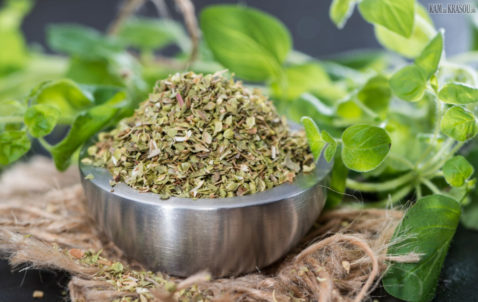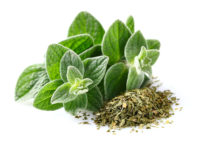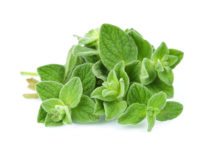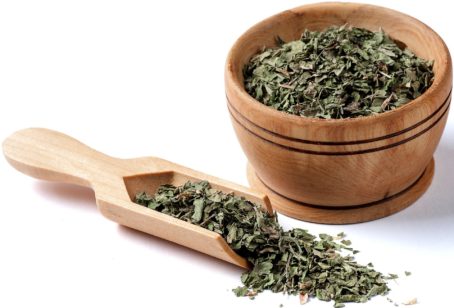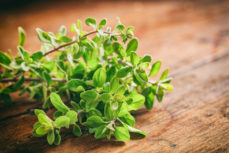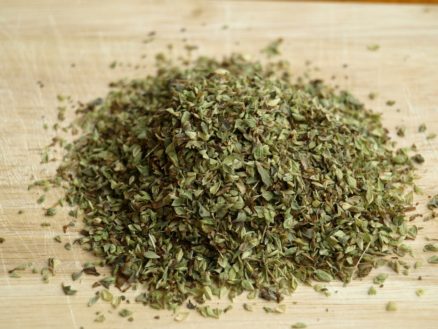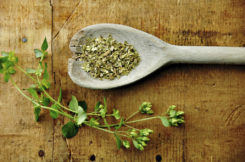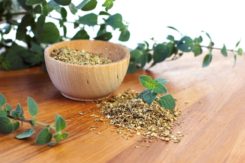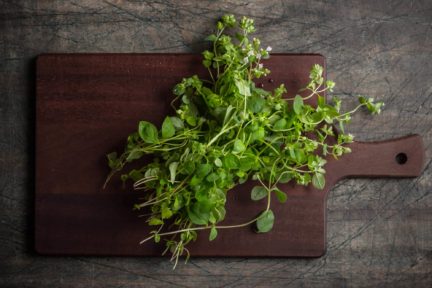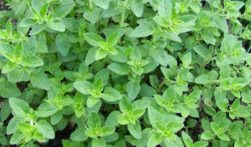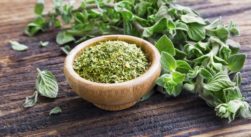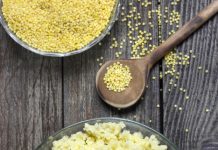Some dishes would not be so tasty and original without spicy spices added to them. Oregano, a plant known since ancient times, has an incomparable taste and magnificent aroma. Oregano is common or oregano - what is it and what does it eat with?
Material Content:
Oregano seasoning (oregano): what is it
Oregano is a perennial herbaceous plant of the family Lamiaceae. It has small oblong-ovate leaves and small, two-lipped, pinkish-white flowers, collected in spikelets forming a panicle. This plant is common in Russia, as well as in Europe and the Mediterranean. It grows on the slopes of the mountains, edges and glades. Translated from the Greek word "oregano" is interpreted as "mountain decoration". An alternative name is oregano.
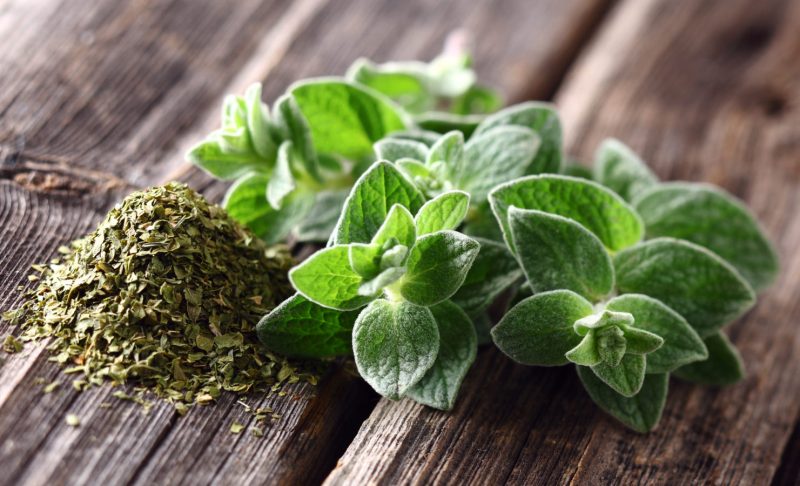
By the way, oregano has long been a well-known plant; it was mentioned by the ancient Greek physician and philosopher Hippocrates in his works.
The main scope of oregano is cooking. Dried and crushed leaves of the plant are used as seasoning.
Useful seasoning properties
Oregano is also used in medicine. From the leaves, stems and flowers of the plant, medicinal infusions, decoctions and teas are prepared. Oregano is also applicable externally - lotions and compresses with it effectively heal wounds. Baths with the addition of oregano tone and improve well-being.
It is interesting. Legend has it that on the island of Crete, animals wounded by hunters - deer, wild goats - were looking for and eating oregano (it was also called ash-tree). The animals ate grass, and arrows soon came out of their bodies by themselves.The wounds were healed, and if the arrow was poisonous - ash-tree neutralized the effect of toxic substances. People noticed this interesting feature and began to use oregano for medicinal purposes, and soon discovered other properties of this plant.
The main beneficial properties of oregano:
- Wound healing. For quick wound healing, lotions and compresses based on grass are suitable.
- Antimicrobial. Infusions and decoctions of oregano neutralize the action of harmful microorganisms that enter the body along with poor-quality food.
- Antispasmodic. The soft action of oregano can relieve spasm, reduce pain.
- Pain medication. Oregano oil is used in the treatment of diseased teeth and joints.
- Soothing. By adding oregano to food, you can get rid of disorders of the nervous system and establish sleep.
Oregano is also very beneficial for women. It can be taken to relieve painful periods. Oregano is also relevant for nursing mothers suffering from a lack of milk. Infusions of oregano are recommended to prevent diseases of the genitourinary system. During menopause, the plant helps fight hormonal disruptions.
Oregano is also useful for gastrointestinal problems: it normalizes stool, improves digestion, and has a soft laxative effect.
A decoction of oregano helps fight colds by eliminating a cough. In general, this plant is recommended for respiratory diseases: asthma, tuberculosis, sinusitis, tonsillitis, acute pharyngitis. In such cases, not only decoctions, but also rinses based on oregano help.
Oregano compresses and applications help fight eczema, neurodermatitis, and acne.
Folk healers use the plant to treat alcoholism.
What dishes add spice
Oregano is a seasoning with a bright bitter-spicy taste. In cooking, both fresh and dried leaves of the plant are used. In addition, the flower buds of the plant can be used as part of the spices.
Together with basil, oregano is considered an indispensable ingredient in Mediterranean cuisine.
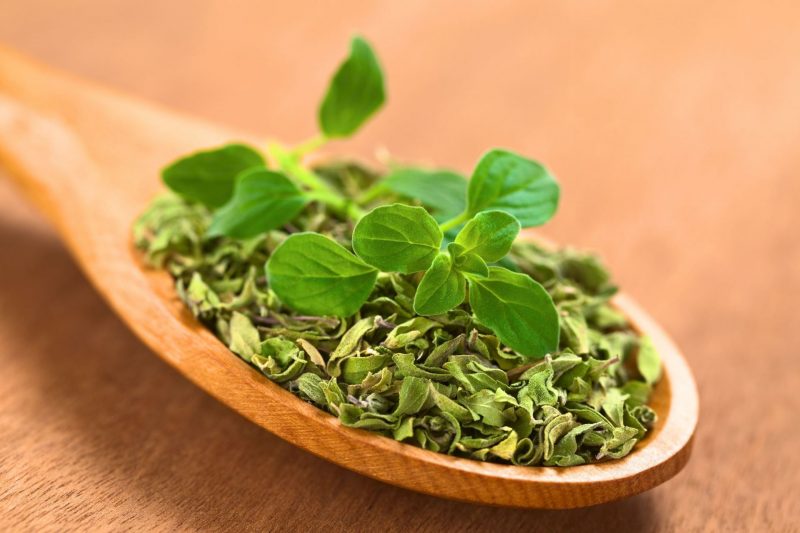
Original taste and aroma of oregano are used in the cooking process:
- various spicy mixtures of herbs;
- salting vegetables;
- pasta, pizza;
- bakery products;
- a variety of sauces (especially tomato);
- pickling fish;
- baked potatoes;
- meat-based soups;
- Bean dishes
- fried eggs and omelettes;
- home-made sausage;
- fried and stewed meat.
What can replace oregano
How to replace oregano? The taste of spices is bright and unique. Nevertheless, the plant has many relatives that can replace oregano in the absence of it.
The closest to oregano in taste is considered marjoram. Sometimes oregano oil is replaced with marjoram and the difference is almost not noticeable. A good substitute is basil mixed with mint or parsley in tandem with dill. A bit like oregano cumin and thyme. You can use Provencal herbs instead of oregano.
But! You should be aware that the listed herbs do not even have approximate useful properties that differ in oregano.
How and how much add oregano
The main principle in applying oregano seasoning is moderation. The strong aroma of spices sprinkled in large quantities can spoil the dish.
How to add oregano:
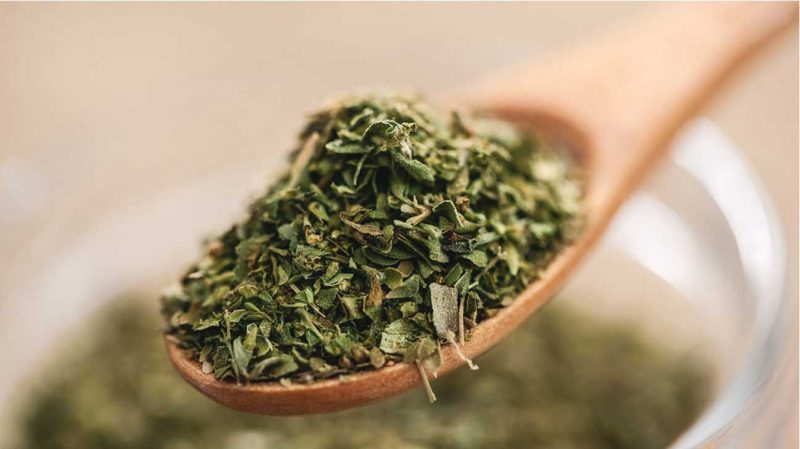
Take a dry spoon, measure the amount of spice indicated in the recipe. You should not pour seasoning from a jar into a hot dish from which steam comes. Rising moisture can spoil the oregano that has become in the jar, causing the latter to stick to a lump. Before use, fresh grass should be finely chopped and mashed by hand. Thus, the unique aroma of oregano is released.
Tip. Sometimes the exact amount of spice is not indicated in the recipe. In this case, you should first add a quarter of a teaspoon of seasoning to 4 servings (500 g) of meat and minced meat. Add 1 tsp to sauce and pasta. freshly cut or dried herbs, in a salad - 0.5 tsp.
When to add oregano:
Fresh leaves are added at the end of cooking to give a bright aroma. The stew is seasoned also at the end of cooking. When cooking the broth, in combination with other herbs, all plants need to be bundled and put in a bag of gauze. It is lowered into the pan, and after cooking the broth is discarded. Spice is added to soft cheese, salads and fruit desserts in advance. This gives the dish the opportunity to soak in the aroma of oregano.
Seasoning storage rules
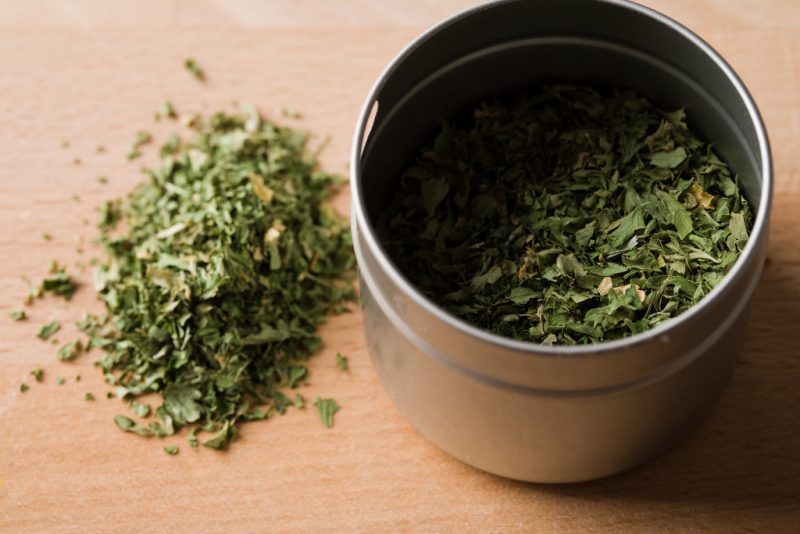
Oregano contains many volatile essential oils. For this reason, the spice must be stored in a sealed container. Experienced culinary specialists use a glass, tightly closed container for these purposes.
Contraindications
Despite the obvious positive qualities, oregano spice is not recommended for use in some cases:
- serious pathologies of the cardiovascular system;
- acute forms of gastrointestinal diseases;
- kidney disease
- individual intolerance to plant components;
- pregnancy (excessive use of spices can provoke a contraction of the uterus, as a result - a miscarriage).
Do not forget that the use of oregano can affect the effect of certain medications.
Men should take into account that oregano has a strong relaxing effect, and therefore may not have the best effect on potency. The regular use of infusions and decoctions of oregano can completely lead to sexual impotence.
Oregano is a perennial plant used in cooking and medicine. Bright taste and spicy aroma make oregano leaves a popular spice in many countries. Oregano seasoning is used in Italian, Belgian, Caucasian and many other cuisines.


